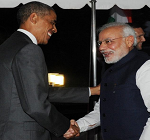Prime Minister Narendra Modi’s visit to the U.S. is likely to achieve only limited results, despite the rapturous media reporting on his various engagements. It is unlikely to translate into a major reset or catapult strained India-U.S. relations onto a higher plane of understanding.
Two reasons make it necessary to introduce this dose of realism into an assessment of Modi’s first visit to the U.S. as prime minister, which culminated in a series of meetings with President Barack Obama and other White House officials.
The first of these reasons is Obama’s diffused bandwidth: his preoccupations with the ongoing strife in Syria-Iraq, the non-cooperation he faces from a partisan U.S. Congress, and the possible inertia from having only two years left in office. Consequently, Obama is unlikely to extend major concessions or go out of his way to sign path-breaking deals with Modi.
But, more importantly, the transactional nature of the relationship–-as a result of which the health of the alliance is determined by the progress of various trade and investment deals—stops it from evolving. Thus, the often-repeated lofty objectives—“shared democratic values” or the concluding paragraph of the joint statement issued after former prime minister Manmohan Singh met Obama in September 2013 (“…the interests of the United States and India continue to converge, and this partnership will indeed be a defining one for the 21st Century”)—remain mere words.1
The current impasse at the World Trade Organisation (WTO) exemplifies this inability of the relationship to evolve: both the U.S. and India are blaming each other for torpedoing outcomes from the Bali ministerial meeting in December 2013.The U.S. claims India has blocked the Trade Facilitation Agreement (TFA)—a compact that will purportedly smoothen trade among countries, thereby boosting global GDP. India counter-claims that the U.S. is only interested in the TFA at the cost of sacrificing the food security concerns of developing countries.
Even U.S. Trade Representative Michael Froman has been providing fodder for this lopsided discourse, including his attempts to incite developing countries from Africa: “Unfortunately, the actions of a small number of WTO Members have placed this enormous opportunity in jeopardy. I hope that Africans will help lead the effort to ensure that our hard work at Bali does not go to waste, that the potential of both TFA and the new Trade Facilitation Agreement Facility are not squandered.” 2
However, the popular narrative in the U.S. is silent about India’s concerns regarding the inaccurate external benchmark used by WTO to determine the extent of the subsidy that countries can provide towards food security. There is also no mention of how the U.S.’s farm subsidy, in absolute terms, is much higher than any other country’s.
Even if we eschew a debate on who is right and who is wrong, it will undoubtedly take deft diplomatic and trade manoeuvring to reach some kind of common ground. But the setting for any meaningful results has already been vitiated by partisan reporting in the mainstream U.S. media and biased analysis by U.S. think tanks.
The conversation about India’s intellectual property rights regime in pharmaceuticals demonstrates the one-sided rendering of this debate. For instance, in April 2013, the Supreme Court of India upheld a decision by the Indian patent controller’s office to deny Novartis a patent for its anti-cancer drug Glivec. 3In the court’s opinion, the pharmaceutical company was indulging in “evergreening” or making slight adjustments in the chemical composition of the drug to prolong its patent life. By doing this, Novartis could continue to have a monopoly over the production of that drug in India and command a premium.
This judgement was seen in the U.S. as part of India’s ongoing infringement of intellectual property rights. The continuous tirade—by U.S. government officials, industry, think tanks, academia, and the media—did not pause to consider that this was the judgement of a court of law, and that Novartis had been given all the opportunities for appeal till its options ran out.
The bilateral flash-points do not end there. The Civil Liability for Nuclear Damage Act (2010), under which nuclear power reactor operators and component suppliers could face unlimited legal liability for an accident, has halted the progress of the India-US civil nuclear deal. Again, there seems to be no regard for the fact the Act was passed by the Parliament of a democratic, sovereign country. In contrast, the U.S. Congress—which ideally should have no powers over a global governance institution—has blocked India’s application for a higher shareholding in the multilateral International Monetary Fund.
These seemingly intractable stand-offs have kept India-US ties anchored in transactional issues. If the U.S. really wants India to be its Asia “pivot” or if India really wants a counterfoil against its neighbours—growing at a rapid pace on one side and indulging in subversive activity on the other—then both must find a way out of the deal-led relationship.
Rajrishi Singhal is Senior Geoeconomics Fellow, Gateway House. He has been a senior business journalist, and Executive Editor, The Economic Times, and served as Head, Policy and Research, at a private sector bank, before shifting to consultancy and policy analysis.
This article was exclusively written for Gateway House: Indian Council on Global Relations. You can read more exclusive content here.
For interview requests with the author, or for permission to republish, please contact outreach@gatewayhouse.in.
© Copyright 2014 Gateway House: Indian Council on Global Relations. All rights reserved. Any unauthorized copying or reproduction is strictly prohibited
1. Ministry of External Affairs, Government of India, Joint statement on Prime Minister’s Summit Meeting with President Barack Obama in Washington D.C, 27 September 2013 http://www.mea.gov.in/bilateral-documents.htm?dtl/22265/Joint+Statement+on+Prime+Ministers+Summit+Meeting+with+President+
Barack+Obama+in+Washington+DC+September+27+2013
2. Office of the United States Trade Representative, Remarks by Ambassador Michael Froman at the African Growth and Opportunity Act (AGOA) Ministerial 4 August 2014, < http://www.ustr.gov/about-us/press-office/speeches/2014/August/Remarks-by-USTR-Froman-at-2014-US-Sub-Saharan-Africa-Trade-Economic-Cooperation-Forum>
3. The Economic Times, Why was Novartis denied a patent for Glivec in India?, 2 April 2013, <http://articles.economictimes.indiatimes.com/2013-04-02/news/38218279_1_glivec-patent-office-fresh-patent>


